The National Council for Human Rights (NCHR) is an Egyptian human rights organization established in 2003 with a mission of promoting and maintaining human rights in Egypt. The NCHR publishes annual reports concerning the current status of human rights within the country. Former UN Secretary General Boutros Boutros-Ghali played a "significant role" in creating the organization, and served as its president until 2012. Since 2012, the organization has been headed by Hossam El Gheriany.

Presidential elections were held in Egypt in 2012, with the first round on 23 and 24 May 2012 and the second on 16 and 17 June. The 2012 Egyptian Presidential election was the first democratic presidential election of Egypt’s history. The Muslim Brotherhood declared early 18 June 2012, that its candidate, Mohamed Morsi, won Egypt's presidential election, which would be the first victory of an Islamist as head of state in the Arab world. It was the second presidential election in Egypt's history with more than one candidate, following the 2005 election, and the first presidential election after the 2011 Egyptian revolution which ousted president Hosni Mubarak, during the Arab Spring. However, Morsi's presidency was brief and short-lived, and he later faced massive protests for and against his rule, only to be ousted in a military coup in July that year.

Parliamentary elections were held in Egypt in 2010. The first stage was held on 28 November 2010 and the second round was held on 5 December 2010.

The 2011 Egyptian revolution, also known as the 25 January revolution, began on 25 January 2011 and spread across Egypt. The date was set by various youth groups to coincide with the annual Egyptian "Police holiday" as a statement against increasing police brutality during the last few years of Hosni Mubarak's presidency. It consisted of demonstrations, marches, occupations of plazas, non-violent civil resistance, acts of civil disobedience and strikes. Millions of protesters from a range of socio-economic and religious backgrounds demanded the overthrow of Egyptian President Hosni Mubarak. Violent clashes between security forces and protesters resulted in at least 846 people killed and over 6,000 injured. Protesters retaliated by burning over 90 police stations across the country.
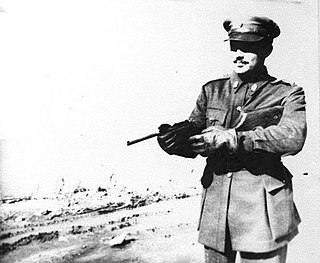
National Police Day is a national holiday in Egypt that occurs each year on 25 January.
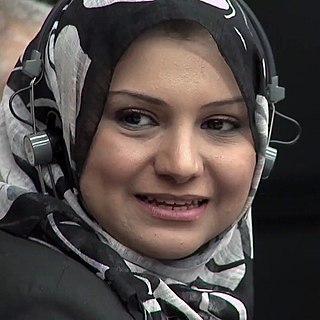
Asmaa Mahfouz is an Egyptian activist and one of the founders of the April 6 Youth Movement. She has been credited by journalist Mona Eltahawy and others with helping to spark a mass uprising through her video blog posted one week before the start of the 2011 Egyptian revolution. She is a prominent member of Egypt's Coalition of the Youth of the Revolution and one of the leaders of the Egyptian revolution.
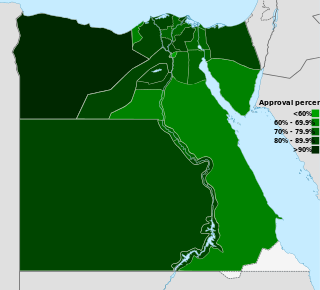
A constitutional referendum was held in Egypt on 19 March 2011, following the 2011 Egyptian revolution. More than 14 million (77%) were in favour, while around 4 million (23%) opposed the changes; 41% of 45 million eligible voters turned out to vote.

The following is a chronological summary of the major events that occurred during the Egyptian Revolution of 2011, after Hosni Mubarak's resignation. Protests and riots led to the deaths of hundreds, injuries of thousands and the arrests of tens of thousands. Millions have mobilised the streets since the revolution.
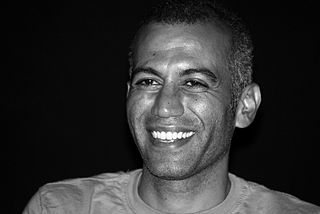
Hossam el-Hamalawy is an Egyptian journalist, blogger, photographer and socialist activist. He is a member of the Revolutionary Socialists and the Center for Socialist Studies.

Human rights in the post-Mubarak transition have been the subject of concern and controversy since the 2011 Egyptian revolution. The Supreme Council of the Armed Forces (SCAF) Arabic: المجلس الأعلى للقوات المسلحة, al-Maǧlis al-ʾAʿlā lil-Quwwāt al-Musallaḥah in particular have been the focus of concerns about human rights violations. The SCAF, which consists of a body of 20 senior officers in the Egyptian military, was handed the power to govern Egypt after the ouster of President Hosni Mubarak on 11 February 2011 as a consequence of the revolution.
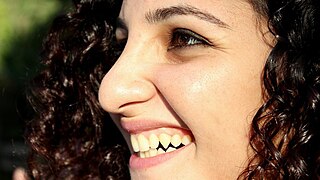
Mona Seif is an Egyptian human rights activist known for her participation in dissident movements during and after the 2011 Egyptian revolution, for her creative use of social media in campaigns, and for her work to end military trials for civilian protesters. She is a biology graduate student, investigating the BRCA1 breast cancer gene.

Mohamed Mohamed Morsi Eissa al-Ayyat was an Egyptian politician and engineer who served as the fifth president of Egypt, from 30 June 2012 to 3 July 2013, when General Abdel Fattah el-Sisi removed him from office in a coup d'état after protests in June. An Islamist affiliated with the Muslim Brotherhood organisation, Morsi led the Freedom and Justice Party from 2011 to 2012.
Reem Maged is an Egyptian journalist and former host of the popular Baladna bel Masry talk show on Egyptian ONTV. Maged's popularity and renown have dramatically increased due to her critical coverage of political events since the 2011 Egyptian revolution, as well as her hosting of individuals on her show that are critical of the military Supreme Council of the Armed Forces, or SCAF, that has ruled Egypt since the resignation of Hosni Mubarak. She has been described as "Egypt’s best and arguably most vocal [female voice] in delivering the true happenings to the country on a nightly basis." Maged stopped presenting the show in 2013 and in 2014 joined a hunger strike campaign in solidarity with political prisoners.
Hosted by Egyptian journalist Reem Maged, Baladna bel Masry is a daily Egyptian talk show broadcast by Egyptian satellite television network ONTV. The show airs Sunday-Thursday at 8:30pm. The ONTV network bills the show as reflecting "all the cultural & entertainment affairs that occur in Egypt," while at the same time offering in-depth analysis on events that accurately represents public views on current affairs.
Following the 2011 Egyptian revolution, the Muslim Brotherhood in Egypt became one of the main forces contending for political power in Egypt against the Supreme Council of the Armed Forces (SCAF) and other established centers of the former Hosni Mubarak regime.

Mahmoud Mekki is an Egyptian politician who served as the vice president of Egypt from August 2012 to December 2012. He was appointed by President Mohamed Morsi following the 2011 revolution and the 2012 presidential election on 12 August 2012. He was Egypt's first vice president from a civilian background rather than a military one. He resigned from his post on 22 December 2012.
Mohamed Bahaa Eldeen Abou Shaka is an Egyptian lawyer and politician. He is a professor of public law, and the current President of the New Wafd Party.

The following is a chronological summary of the major events that occurred after the Egyptian Revolution of 2011, after Mohamed Morsi's election as the fifth President of Egypt, on 30 June 2012. This article documents the third wave of the Egyptian Crisis.

The 2012–2013 Egyptian protests were part of the crisis in Egypt including the June 2013 protests, the July 2013 coup d'état, and part of the post-coup unrest. They saw varying opposition against three contiguous heads of state; namely, SCAF, Muslim Brotherhood, and the de facto ruling Egyptian Armed Forces.
The April 6 Youth Movement Democratic Front is an Egyptian activist group established in spring 2011 after the differences in the April 6 Youth Movement, led by Ahmed Maher. Differences in the Movement started to appear in April when leaders of the movement announced they would transform it into a NGO or foundation on its anniversary. TV host and founder, Abd Alrahman Ezz, of April 6 "Democratic Front", told Ahram Online that the decision was taken without consultation. "It was taken with no respect for democracy, for the majority," Ezz says. The lack of internal democracy is the main reason why some left the mainstream movement, led by Ahmed Maher, forming the Democratic Front, Ezz says most of the old members joined the Democratic Front. On August 5, a group of April 6 Youth Movement members in Alexandria announced that they had joined the Democratic Front, leaving the Ahmed Maher front due to what they considered discrimination in decision making processes.












